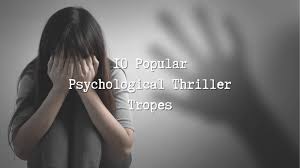10 Thriller Tropes That Never Fail to Captivate Audiences
Discover 10 timeless thriller tropes that consistently engage readers and viewers. From unreliable narrators to race-against-time scenarios, explore what makes these elements so effective
Thrillers have long captivated audiences with their suspenseful narratives and unexpected twistsCertain tropes within this genre have proven to be particularly effective in maintaining tension and engagementThis article explores ten such tropes that continue to resonate with readers and viewers alike
1. The Unreliable Narrator
An unreliable narrator keeps audiences questioning the truth, adding layers of complexity to the narrativeThis trope is exemplified in works like Gone Girl, where conflicting accounts create a web of deception citeturn0search0
2. The Amnesiac Protagonist
Characters suffering from memory loss add an element of mystery, as they—and the audience—struggle to piece together past eventsThis approach is central to stories like Before I Go to Sleep citeturn0search0
3. The Small Town with Dark Secrets
Setting a thriller in a seemingly idyllic small town that harbors sinister secrets creates a stark contrast that heightens suspenseSharp Objects effectively utilizes this setting to unravel a complex narrative citeturn0search0
4. The Doppelgänger
The appearance of a character’s double introduces themes of identity and reality, often leading to psychological tensionThis trope is explored in The Silent Patient, where hidden identities play a crucial role citeturn0search0
5. The Isolated Protagonist
Isolation, whether physical or emotional, intensifies a character’s vulnerability and the story’s tensionIn The Woman in the Window, the protagonist’s agoraphobia adds depth to the suspense citeturn0search0
6. The Cat-and-Mouse Game
A relentless pursuit between protagonist and antagonist creates a dynamic narrative filled with tension and strategic maneuveringThe Girl with the Dragon Tattoo showcases this interplay effectively citeturn0search0
7. The Psychological Manipulator
Characters who manipulate others psychologically add a layer of mind games and deceit to the storyIn You, the protagonist’s charm masks a darker, controlling nature citeturn0search0
8. The Dark Family Secret
Uncovering long-buried family secrets often leads to shocking revelations that drive the plot of psychological thrillers We Were Liars delves into the devastating impact of such secrets cite turn0search0
9. The Cult
Stories involving cults explore the psychology of collective belief systems and the allure of charismatic leaders, often leading to terrifying consequencesThe Girls by Emma Cline examines this dynamic cite turn0search0
10. The Supernatural Twist
Incorporating supernatural elements into a thriller can amplify the sense of dread and uncertainty, blurring the line between reality and the paranormalThe Shining by Stephen King is a prime example cite turn0search0
These ten tropes have stood the test of time, consistently engaging audiences with their unique ability to build suspense and deliver unexpected twists Understanding and effectively utilizing these elements can enhance the impact of any thriller narrative
FAQ
Q: Why do certain thriller tropes remain effective over time?
A:They tap into fundamental human fears and curiosities, such as the unknown, betrayal, and the struggle for survival, which continue to resonate across generations
Q: Can overuse of these tropes make a story predictable?
A:Yes, if not executed with originality. It’s important to add unique twists or perspectives to keep the narrative fresh
Q: Are these tropes exclusive to literature?
A:No, they are prevalent across various media, including film, television, and even video games, due to their universal appeal


